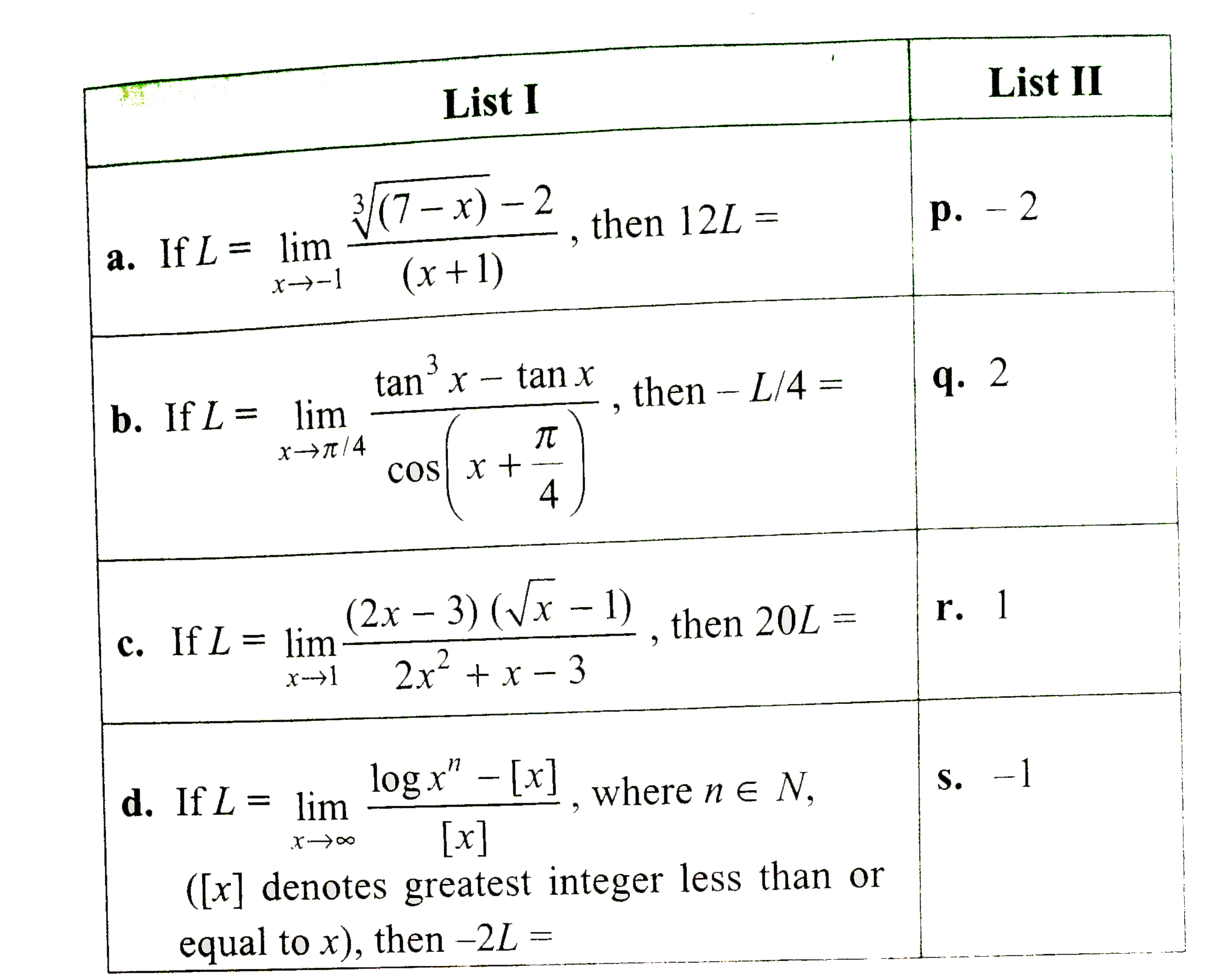(lim)(n→∞)20∑x=1cos2n(x−10) is equal toSolution in Bengali
(a) 2
(b) 0
(c) 1
(d) -1
The correct Answer is:B
limn→∞cos2nx={1, x=rπ,r∈l0, x≠rπ,r∈l
Here, for x=10, limn→∞cos2n(x−10)=1 and in all other cases, it is zero. Therefore,
limn→∞∞∑x=1cos2n(x−10)=1
Topper's Solved these Questions
- LIMITSBOOK - CENGAGE PUBLICATIONCHAPTER - LIMITSEXERCISE - Linked Comprehension Type
20 Videos
- LIMITSBOOK - CENGAGE PUBLICATIONCHAPTER - LIMITSEXERCISE - Matrix Match Type
5 Videos
- LIMITSBOOK - CENGAGE PUBLICATIONCHAPTER - LIMITSEXERCISE - EXERCISE 2.8
8 Videos
- JEE 2019BOOK - CENGAGE PUBLICATIONCHAPTER - JEE 2019EXERCISE - Chapter 10
8 Videos
- LINEAR COMBINATION OF VECTORS, DEPENDENT AND INDEPENDENT VECTORSBOOK - CENGAGE PUBLICATIONCHAPTER - LINEAR COMBINATION OF VECTORS, DEPENDENT AND INDEPENDENT VECTORSEXERCISE - DPP 1.2
10 Videos
Similar Questions
Letf(x)=sin−1(1−{x})×cos−1(1−{x})√2{x}×(1−{x}), where {x} denotes the fractional part of x.
L=limx→0−f(x) is equal to
View SolutionMatch the following lists:

View SolutionEvaluate limx→1cosπ2x1−√x
View SolutionIf y = y(x) is the solution of the differential equation, xdydx+2y=x2 satisfying y(1) = 1, then y(12) is equal to
View SolutionThe number of integral values of p for which (p+1)ˆi−3ˆj+pˆk,pˆi+(p+1)ˆj−3ˆk and −3ˆi+pˆj+(p+1)ˆk are linearly dependent vectors is q
View Solution(lim)x→∞20∑x=1cos2n(x−10) is equal to (a) 0 (b) 1 (c) 19 (d) 20
View Solution(sum_(n=1)^(10)int_(-2n-1)^(-2n)sin^(27)(x)dx+sum_(n=1)^(10)int_(2n)^(2n+1)sin^(27)(x)dx)
View SolutionLet f(x)=(lim)n→∞2x2nsin1x+x1+x2n then find : (lim)x→−∞f(x)
View SolutionLet f(x)=limn→∞xx2n+1. Then
View SolutionThe value of [10∑n=1∫−2n−2n−1sin27xdx+10∑n=1∫2n+12nsin27xdx] is equal to -
View Solution∞∑n=112n−1⋅x2n=
View Solution10∑n=1∫2n−2n−1sin27xdx+10∑n=1∫2n+12nsin27xdx=
View Solution(lim)x→∞20∑x=1cos2n(x−10) is equal to (a) 0 (b) 1 (c) 19 (d) 20
View SolutionIf f(x) is integrable over [1,2], then ∫21f(x)dx is equal to (a) (lim)n→∞1nn∑r=1f(rn) (b) (lim)n→∞1n2n∑r=n+1f(rn) (c) (lim)n→∞1nn∑r=1f(r+nn) (d) (lim)n→∞1n2n∑r=1f(rn)
View Solutionx=∞∑n=0cos2nθ,y=∞∑n=0sin2nθ,z=∞∑n=0cos2nsin2nθ,|cosθ|<1,|sinθ|<1 then x+y+z is equal to
View Solution
